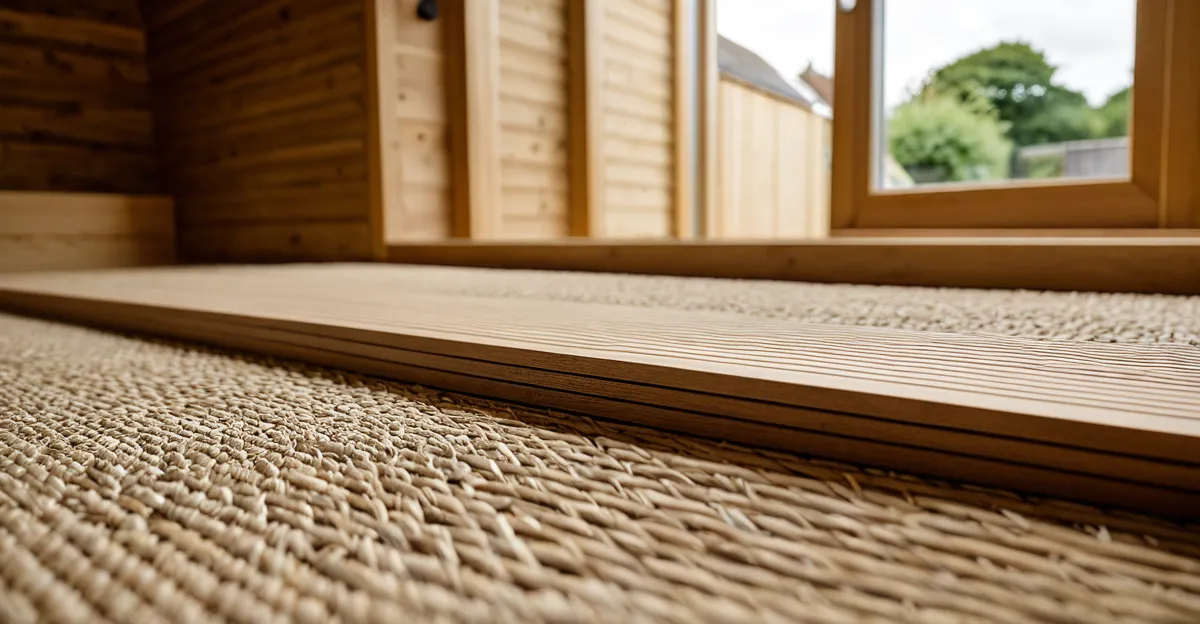Essential Sustainable Materials for UK Home Renovation
Sustainable building materials UK are gaining momentum in eco-friendly home renovation efforts. Using green materials UK isn’t just about reducing carbon footprints; it involves choosing materials with proven durability, recyclability, and local availability. These criteria ensure materials last longer, generate less waste, and reduce transportation emissions, making them truly sustainable choices.
When selecting sustainable building materials UK, consider durability to avoid frequent replacements. Recyclability is crucial because materials can re-enter production cycles instead of landfill. Local availability minimizes transport impacts, supporting UK suppliers and reducing emissions tied to long-distance shipping.
Also to read : How Can You Transform Your Living Space into a Cosy Retreat?
Environmental impact assessments (EIAs) and lifecycle assessments (LCAs) help measure ecological footprints realistically. They evaluate energy consumed in extraction, manufacturing, transport, use, and disposal phases. Choosing materials verified by LCAs ensures informed decisions in eco-friendly home renovation projects.
Popular green materials UK often feature natural fibres, recycled content, and responsibly sourced timber. These reduce reliance on virgin resources while maintaining performance. Embracing such materials aligns with eco-conscious aspirations and delivers lasting benefits in UK homes.
Also to discover : What are creative ways to personalize your UK living space?
Reclaimed Wood and Timber: Durable and Characterful Choices
Reclaimed wood UK and sustainable timber are increasingly popular in eco-friendly home renovation. Their appeal lies in durability and unique character, combining environmental benefits with aesthetic quality. Using reclaimed wood salvages existing material, reducing demand for new lumber and deforestation. This supports sustainable forestry and lowers carbon emissions associated with timber production.
FSC-certified timber ensures responsible woodland management, confirming that the wood is sourced sustainably and legally. This certification is particularly important for buyers prioritizing environmental and ethical standards in wood products. In UK homes, reclaimed and FSC timber often feature in flooring, exposed beams, and cabinetry, adding warmth and historical charm.
When sourcing reclaimed wood UK, authenticity matters. Buyers should verify origins and treatments to avoid contaminants or structural inconsistencies. Costs vary by wood type and provenance but typically reflect higher quality and craftsmanship. Local suppliers specializing in reclaimed timber can offer greater transparency and reduce transport emissions, aligning with sustainable building materials UK principles.
Choosing reclaimed wood UK or sustainable timber therefore supports eco-friendly wood sourcing, enriching projects both visually and sustainably.
Recycled Insulation Materials: Efficient and Green Solutions
Recycled insulation UK options are increasingly vital to eco-friendly home renovation. Popular types include cellulose insulation made from recycled paper, sheep’s wool which is natural and biodegradable, and plastic-based options like recycled polyester. Each offers a balance of sustainability and thermal efficiency, helping reduce heating bills and carbon footprints.
Cellulose insulation is effective for soundproofing and thermal retention, while sheep’s wool excels in moisture regulation naturally. Recycled polyester insulation provides durability and easy installation. When choosing recycled insulation UK, consider the material’s life-cycle assessments; many have lower embodied energy than conventional alternatives.
Installation is straightforward but requires checking for proper vapor barriers to prevent damp issues. Sourcing sustainable insulation locally in the UK not only cuts transport emissions but also supports green materials UK suppliers committed to eco-friendly home insulation practices.
In summary, recycled insulation UK combines environmental responsibility, performance, and affordability, making it a smart choice for sustainable building materials UK. Buyers should verify product certifications to ensure authentic sustainable insulation meets both ecological and regulatory standards.
Eco-Friendly Paints and Finishes for Healthy Living Spaces
Choosing eco paints UK with low volatile organic compounds (VOCs) is crucial for indoor air quality in eco-friendly home renovation. VOCs emit harmful gases that can trigger allergies and respiratory issues. Low VOC paints reduce these risks, making living spaces healthier. Natural finishes like clay, lime, and plant-based oils further enhance air purity without sacrificing aesthetics.
What are low VOC paints? They are formulated with minimal solvents and chemicals that off-gas fewer toxins during and after application. This makes them ideal for UK homes where ventilation may be limited, especially in renovated older buildings.
Recommended brands in the UK prioritize eco labels and certifications, ensuring products meet stringent environmental standards. Application requires proper surface preparation to maximize adhesion and coverage, reducing waste. Cost-wise, eco paints UK may be slightly higher than conventional options but yield long-term health and environmental benefits.
In sum, selecting eco paints UK and natural finishes contributes significantly to sustainable building materials UK by promoting healthier, toxin-free environments, complementing other green materials UK choices in renovation projects.
Sustainable Flooring: Modern and Traditional Alternatives
Sustainable flooring UK offers diverse options balancing durability, style, and environmental care. Popular green materials UK for flooring include bamboo, cork, recycled carpet, and natural linoleum. Bamboo flooring UK stands out for rapid renewability and strength, making it a preferred choice in eco-friendly home renovation projects. Cork, harvested without tree felling, provides natural insulation and resilience, ideal for UK climates.
Eco carpets utilize recycled fibers, reducing landfill waste and energy use. Natural linoleum is biodegradable and well-suited for allergen-sensitive homes. These sustainable flooring UK materials also generally require less chemical treatment, enhancing indoor air quality and aligning with green materials UK standards.
Durability is key; bamboo and cork resist wear well, while eco carpets vary based on fiber type. Care involves mild cleaning agents to prolong lifespan and maintain appearance. Availability across UK retailers is growing, with options for various aesthetic preferences and budgets.
Choosing sustainable flooring UK not only supports carbon footprint reduction but also delivers practical, stylish solutions. It integrates seamlessly with other sustainable building materials UK in eco-friendly home renovation.
Stone, Brick, and Other Natural Materials with Low Environmental Impact
Natural brick UK and sustainable stone are valued eco-friendly masonry materials in UK home renovation due to their durability and low environmental footprint. Reclaimed or recycled brick and stone reduce waste and lessen the demand for new extraction, making them key green materials UK for preserving heritage and minimizing ecological harm.
What makes natural brick UK sustainable? Its long lifespan and low maintenance reduce replacement frequency and resource use over time. Similarly, sustainable stone provides excellent thermal mass, helping regulate indoor temperatures and lowering energy needs. Both materials often comply with strict UK heritage and planning regulations, particularly for older buildings, ensuring eco-conscious renovation without compromising character.
Sourcing reclaimed stone or brick locally cuts transport emissions and supports responsible suppliers. Verifying authenticity and structural integrity of reclaimed masonry is crucial to maintain safety while adhering to sustainable building materials UK standards.
In summary, natural brick UK and sustainable stone combine time-tested resilience with environmental responsibility, offering ideal choices for homeowners pursuing eco-friendly home renovation that respects tradition and sustainability.
Certification Schemes, UK Regulations, and Sourcing Guidance
Understanding UK sustainable building certifications is vital for anyone pursuing eco-friendly home renovation. Key schemes like BRE’s BREEAM and FSC certification ensure sustainable building materials UK meet rigorous environmental and ethical standards. BREEAM assesses a material’s lifecycle impact—including energy use, emissions, and recyclability—helping builders select truly green options. FSC certification specifically guarantees that timber products come from responsibly managed forests, crucial for verifying responsible materials sourcing UK.
UK building regulations increasingly favor sustainability, mandating energy efficiency and minimal environmental harm in renovation projects. Compliance with these rules not only ensures legal adherence but also promotes use of green materials UK that contribute to reducing carbon footprints. For instance, the Future Homes Standard requires lower carbon outputs, pushing suppliers and homeowners toward certified sustainable products.
To verify material claims, consumers should request documentation like certification labels and independent test results. Working with reputable UK suppliers committed to transparency further supports responsible purchasing. Using certified, regulated, and carefully sourced products protects both the environment and the quality of your eco-friendly renovation, reinforcing trust in sustainable building materials UK.











